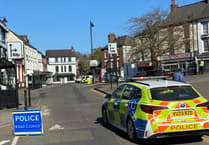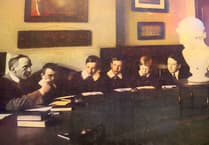THE ambulance service in the South West is renewing its appeal to the public to use 999 “appropriately” during planned industrial action on Monday (January 23).
The South Western Ambulance Service NHS Foundation Trust (SWASFT) is again urging people to only call if it is a life-threatening or life-altering emergency, with staff set to walk out as part of the ongoing dispute with the government over pay and working conditions.
The trust says on days where there is strike action, patients should continue to call 999 if there is a medical or mental health emergency, when someone is seriously ill or injured and their life is at risk.
Ambulances will be able to respond in these situations, but this may only be where there is the most immediate risk to life.
Where the situation is not life-threatening, people are asked to seek alternative support through NHS 111 online or by calling NHS 111, and where possible, it is advised that members of the public arrange alternative transport if they need to visit a healthcare facility.
It adds that while the NHS “remains open to anyone that needs it”, there are some things people can do ahead of the strikes to help ensure services can care for those who are most in need, including having enough medication in stock, both prescription and self-care.
Will Warrender, Chief Executive of the South Western Ambulance Service NHS Foundation Trust said: “I want to take this opportunity to say a huge thank you to the communities that we serve. We have been asking you to support us by only calling 999 for life-threatening emergencies and your support has meant that we could prioritise those patients most in need of our help.
“As we look ahead to Monday, we are again asking for your support, as we absolutely must have crews available for the most life-threatening conditions and we will be prioritising these patients first.
“This means there will be other patients waiting for an ambulance, and we will get to them as soon as we can. We are sorry that we may be unable to respond as quickly as we would like.
“You should also be aware that less serious, non-life-threatening incidents may not receive a response for the duration of the strike.
“If you are waiting for an ambulance, please do not call back asking for an estimated time of arrival. We cannot provide this information and it blocks our lines for other callers.
“Please be reassured that we are doing all we can to manage winter pressures and the upcoming industrial action, including receiving military support during industrial action days, which will allow our ambulance clinicians to crew more ambulances and reach patients more quickly.”
Chief Medical Officer at NHS Gloucestershire, Dr Andy Seymour said: “One Gloucestershire health and care partners are working closely together to ensure those in greatest need continue to have access to high quality care on Monday.
"However, we need to be very clear that the coming days are going to be very challenging for those providing care and we are going to need the public’s continuing support as well.
"If it’s not a life threatening condition or a serious injury, we are urging people to think very carefully about their healthcare options and get advice when needed from NHS 111 and ASAP Glos NHS.
"Advice will also be available through local NHS social media channels.
"We would like to take the opportunity to thank the great majority of local people who continue to access services responsibly and are following the advice offered by the local NHS.”
SWASFT has provided the following advice for accessing services during industrial action:
• Self-care – visit online for self-care advice for things like grazed knees, coughs and colds
• Pharmacy – visit your local pharmacy for headaches, upset stomachs, aches and pains
• NHS 111 – visit online or call 111 for advice and support 24hours a day, seven days a week
• GP – call your GP for symptoms that won’t go away
• Minor injury unit – attend your local minor injuries unit for urgent not life threatening conditions and injuries such as sprains, fractures and burns
• 999 – call 999 for life-threatening emergencies such as cardiac arrest, loss of consciousness, fits that aren’t stopping, chest pain, breathing difficulties, severe bleeding, severe allergic reactions, suspected stroke and serious head injuries.





Comments
This article has no comments yet. Be the first to leave a comment.